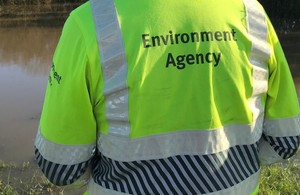Showcase Cornish farm hosts Environment Agency Chairman
A livestock farm leading the way in catchment sensitive farming in Cornwall hosted a visit by Sir Philip Dilley, the Environment Agency Chairman, and the Bude Cleaner Seas Project this week (Monday 23 November).

Killock Farm, owned by Mark and Jo Vickery, supports 2,000 pigs, beef and sheep and is within a river catchment that impacts directly on the bathing water at the popular tourist beach of Summerleaze in Bude.
The catchment surrounding Bude Summerleaze is approximately 8,870 hectares and dominated by intensive agricultural production. The steep nature of the catchment means agricultural run-off rapidly enters the rivers Neet and Strat, and then the sea at Summerleaze Beach. This can lead to short term pollution which poses a risk to swimmers. 16 Environment Agency pollution alerts were issued for the beach in 2015. The Vickerys, who also run a local farm shop, appreciated the potential damage poor bathing water could do to the local economy and worked with a local voluntary group, Bude Cleaner Seas, to improve pollution control measures on the farm.
The Bude Cleaner Seas Project has helped Mr and Mrs Vickery install a rainwater harvesting tank by applying for a Catchment Sensitive Farming grant. The tank prevents rainwater from washing polluted yard run off into the nearby river, which affects the bacteria levels at the bathing water. Mr Vickery has also fenced off fields along the river to prevent cattle from further polluting the river.
Sir Philip Dilley, Chairman of the Environment Agency, said:
I was delighted to visit Killock farm and see firsthand what can be done to reduce agricultural run-off and improve water quality. It is a wonderful example of the pollution control measures that can be taken, quite easily, and have real tangible benefit for the environment, farmers and tourists alike.
Nationally, water quality at beaches is better than any time in living memory, with nearly all of England’s beaches meeting the new stringent EU water quality targets. The Environment Agency will continue to work with farmers, like the Vickerys, to maintain and improve water quality.
Farmer Mark Vickery said:
The measures we have taken at Killock Farm have been easy to do and it is great to see the tangible benefits. I would urge farmers with watercourses running through their land to look at how they can install similar measures. Not only do the improvements save us money on the farm but are good for the local community and environment.
Ian Saltern, Volunteer Cornwall project manager, said:
It was great to welcome Sir Philip to Bude and to visit one of the farms which has worked with us to help reduce the potential for pollution to impact on the quality of local bathing water. We have demonstrated that projects with a local focus, using local knowledge can be really successful in addressing issues which affect the quality of bathing water.
In England, the Catchment Sensitive Farming Project is run by Natural England, Defra, and the Environment Agency. Training and advice is available to farmers on how to implement practical and cost-effective solutions to improve water quality.